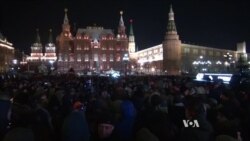Russian opposition leader Alexei Navalny has been detained after trying to join his supporters in central Moscow Tuesday protesting his sentencing on fraud charges earlier in the day.
The court gave the lawyer and blogger a suspended sentence for embezzlement but ordered his brother Oleg Navalny, who also was on trial, to serve three-and-a-half years in prison.
Political analysts said the court's action demonstrates the Kremlin's fear of leaders who can mobilize public opposition to Russian President Vladimir Putin.
Hundreds of Alexei Navalny's supporters protested near the Kremlin Tuesday night, demanding that the opposition leader and his brother Oleg be set free.
Police, out in full force, detained Alexei Navalny as he tried to join the rally, in violation of his house arrest.
Call for protests
Earlier in the day, Alexei Navalny called for sustained street protests after he and his brother were sentenced.
"This power does not deserve to exist, it should be destroyed. I am calling today on everybody to take to the streets, I'm calling to take to the streets until the power which tortures innocent people is removed," Alexei Navalny said.
In Washington, U.S. State Department spokesman Jeff Rathke called the guilty verdict "disturbing."
“The decision is a disturbing development in our view, and it appears to be designed to further punish and deter political activism. This appears to be another example of the Russian government's growing crackdown on independent voices,” Rathke said.
Jeff Mankoff, a Russia expert at the Center for Strategic and International Studies in Washington, said the targeting of high-profile activists sends a message to the Russian public that they, too, are vulnerable and the law will not protect them.
“So even though you haven’t had the widespread visible opposition you had, say, in late 2011, and even though Putin’s approval ratings are around 80 percent, I think the careful handling of this case indicates the fact that the political leadership is still worried that somewhere below the surface that opposition sentiment continues to bubble,” Mankoff said.
A surge in nationalism this year following Russia's annexation of Crimea distracted the public's attention from the corruption issues championed by Alexei Navalny. He led protests in 2011 and 2012 against Putin that were the largest shows of public opposition since the Russian leader came to power.
The court’s decision to jail Navalny's brother, Oleg, but not him is a sign that the Kremlin fears making the opposition leader into a martyr, said Russian political analyst Nikolai Petrov.
"They are very afraid of making Navalny a hero who is staying behind bars and who can serve as informal leader for all opposition movements, for protests and so on," Petrov said.
"And, I think that when making this final decision about a pretty soft sentence, the Kremlin took into consideration, well, a worsening economic situation and the possibility of large-scale social protest and, well, this movement in social networks," he added.
Court date moved
Over 33,000 Navalny supporters signed up to protest the verdict on January 15, but the court on Monday abruptly moved up the date by two weeks.
At the hastily arranged evening rally, a much smaller group of Navalny supporters chanted for freedom in Russia and denounced Putin.
The turnout was pretty good considering the timing - just a day before New Year's Eve and with freezing temperatures, said protester Mikhail.
"Of course they wanted to weaken the reaction, because on the 15th more people would have turned out. But I think they will still come on the 15th," Mikhail said.
Some scuffles broke out as supporters of Putin clashed with the protesters. A number of people were arrested as busloads of riot police moved in after a couple of hours to clear the square of any signs of public opposition.





